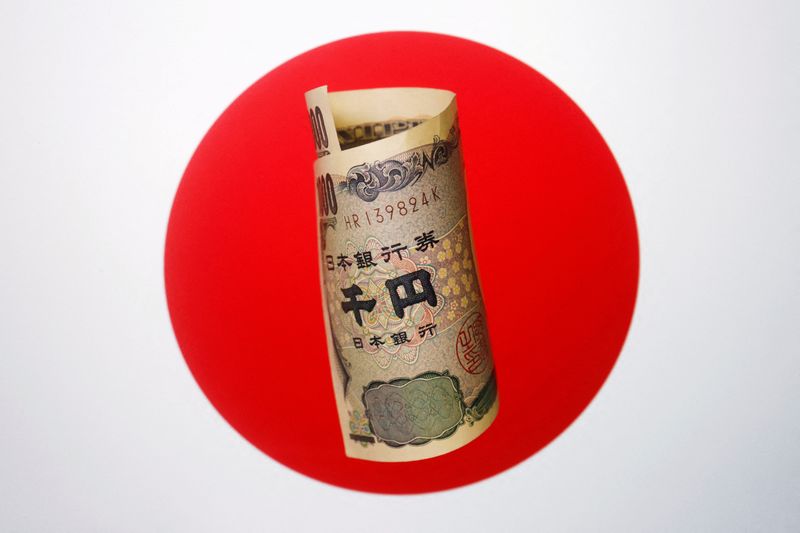By Jamie McGeever
ORLANDO, Fla. (Reuters) - Japan's historic FX market intervention on Sept. 22 failed to stem the wave of speculative bets against the yen, culminating in a fresh 32-year low through 150.00 per dollar and a second round of intervention last week.
Against the backdrop of a yawning U.S.-Japanese interest rate and bond yield chasm, however, hedge funds and speculators are unlikely to be deterred by the Bank of Japan and Ministry of Finance from betting on further yen weakness.
Right on cue, a suspected third bout of BOJ/MOF intervention in early Asian trading on Monday after the yen had slumped back towards the 150.00 level underscores the fight Japan has on its hands to support its currency.
(Dollar/yen & BOJ interventions https://fingfx.thomsonreuters.com/gfx/mkt/byvrlolerve/jpy.png)
The evolution of Commodity Futures Trading Commission positioning since last month's intervention, and a deeper dive into the latest CFTC figures for the week to Oct. 18 - three days before BOJ/MOF's second salvo - back this up.
The most recent CFTC report shows that funds increased their net short yen position to almost 95,000 contracts, the largest bet against the currency since early June. It is a wager worth almost $8 billion.
(CFTC yen positions & USD/JPY https://fingfx.thomsonreuters.com/gfx/mkt/egvbynybjpq/CFTCJPY.jpg)
(CFTC yen positions - shorts only https://fingfx.thomsonreuters.com/gfx/mkt/dwpkdgdqlvm/CFTCJPYSHORTS.png)
A short position is essentially a wager that an asset's price will fall, and a long position is a bet it will rise.
The increase of more than 17,000 contracts from the prior week in net shorts was the most bearish shift in five weeks. Significantly, it was driven almost entirely by fresh short positions rather than longs being cut.
Funds increased their gross short positions by more than 17,000 contracts. There have only been four bigger moves this year. In aggregate, funds' short position of almost 125,000 contracts is the largest since November last year.
"The effects of yen buying intervention have already diminished," NatWest's Yoshio Takahashi wrote on Friday. "Yen buying intervention is intended to control the speed of currency movements and not to actively bolster the yen, so investors are less on guard against intervention."
FED-BOJ POLICY CHASM
The latest bouts of intervention may flush out some short positions, which would be welcomed by Japanese officials keen to suppress speculation and "excessive" volatility.
But a look at CFTC positioning shifts around the Sept. 22 intervention - Japan's first official yen purchases in 24 years - and subsequent moves in the yen's exchange rate are revealing.
In the following week, CFTC specs cut their short yen positions by almost 11,000 contracts. That was the biggest reduction in seven weeks, and one of the five largest this year.
But it failed to materially reduce the net speculative wager because funds also substantially reduced their long yen position.
Ultimately, funds trimmed their net short yen position by only a few thousand contracts following the Sept. 22 intervention. The latest CFTC data shows they evidently felt confident enough to load up on short yen positions again.
(CFTC yen positions - net & weekly change https://fingfx.thomsonreuters.com/gfx/mkt/klvygegjmvg/CFTCJPY.png)
That intervention cost BOJ/MOF almost $20 billion. So far, authorities have officially declined to confirm Friday's and Monday's interventions, never mind the quantities involved. But many billions more are likely to have been spent.
Japan has $1.25 trillion of FX reserves, but Tokyo will be reluctant to dip too deeply into that stash. A doom loop could ensue whereby Japan sells Treasuries, U.S. yields rise, the dollar becomes more attractive, it appreciates, and Japan is forced to intervene in even greater size to support the yen.
Speculators know this. They also know that the BOJ is the only G10 central bank not to be raising interest rates, while the Fed is on track to raise rates to around 5%, according to current market expectations.
Analysts at Morgan Stanley (NYSE:MS) estimate that the level of dollar/yen consistent with a 5% Fed terminal rate is around 150.00. They are dialing back their bullish stance on dollar/yen, but "also suggest buying the dip if intervention once again causes USD/JPY to drop well below levels consistent with the envisaged Fed terminal rate."
(The opinions expressed here are those of the author, a columnist for Reuters.)
Related columns:

- Beware yen, global market ructions if Japan tweaks 'YCC' (Oct. 20)
- King dollar delivers bumper Q3 for macro hedge funds (Oct. 9)